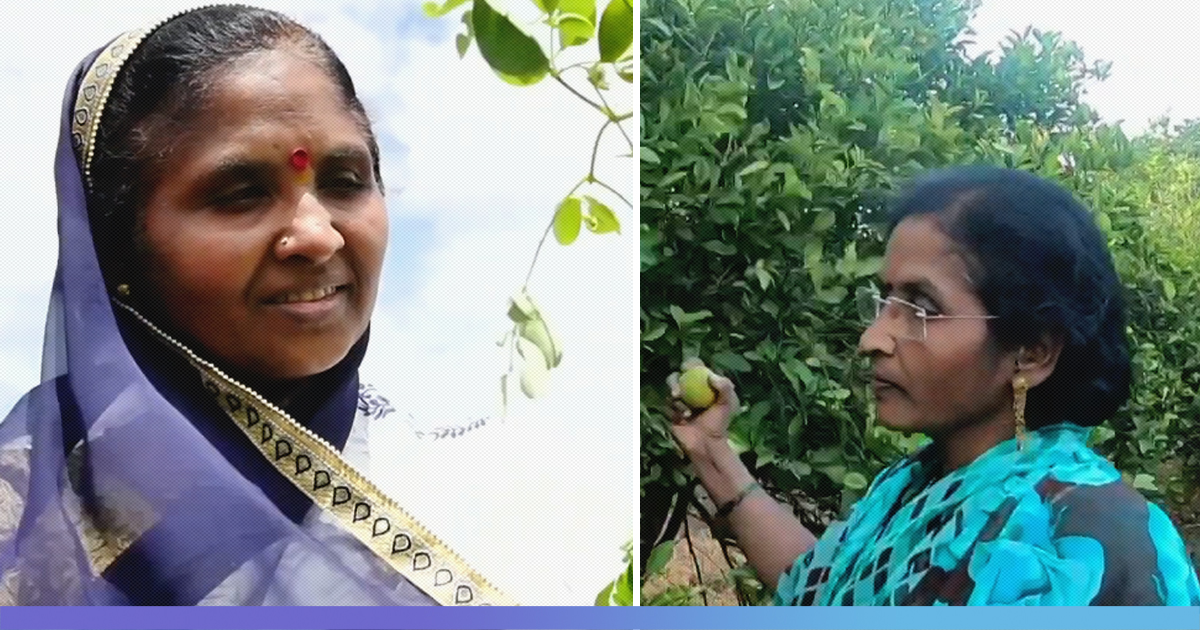This is the story of a 49-year-old woman farmer who is making heads turn in the farming community.
Mangala Pandge reaped Rs 3.6 lakhs from her drumsticks produce in a span of just seven months with an input cost of just Rs 5,000, which was largely the cost of labor. She was given the seeds by her mentor. The oranges from her farm were all sold off in bulk orders.
As Latur reeled under extreme drought conditions and other farmers waited for rains to sow rabi crops, Pandge managed to earn profit.
But what is the secret to her success?
Pandge, who hails from Bhoisamudraga village in Latur, has managed to create a farm which is drought-resistant. Her farm is based on an agroforestry model.
She was educated about the model by The Art of Living natural farming experts.
“I didn’t even have to step into the market. They were so good in quality and taste, that my oranges sold off at almost twice the general market price, all of it via orders,” Pandge tells The Logical Indian.
Even as India recorded the heaviest monsoon showers in 25 years and raging floods killed over 1,600 people since June, Maharashtra’s Latur district remained water-starved.
Latur, which is in the Marathawada region, is a perennial drought-prone area.
This year, at least ten cases of farmer suicides were reported from Marathwada region of Maharashtra. In July, indebtedness and dry spell prompted a 45-year-old farmer in Latur to commit suicide by consuming poison.
But despite all the difficulties, Pandge is creating miracles on her land.
“We have to adapt according to the type of soil and water availability. Most of our losses happen because we have not been taught how to adapt to the changing climatic patterns and uncertainties that come with it,” Pandge says.
“Nature has a dry spell each three-five years and adapting to that is what we have to learn,” Pandge shares, “I have less water in my village so I grow crops accordingly. I have drumsticks, oranges, custard apple, wheat, jowar, potato, onion, pumpkin, soyabean, moong in my 10 acre farm.”
Pandge makes all the natural inputs for farming at home like bio enzymes, biofertilizers (made from cow dung and urine) and vermicompost. This type of cropping and soil conservation is not just making the soil in her farms more fertile but is also making her self-sufficient.
The formula is simple – if one crop fails, she can still cover the loss from the other crops which thrives under the same climatic variation.
“I don’t have to rely on a single crop. I have multiple crops which make it sustainable in any condition,” she says.
Pandge, who runs a small grocery shop, has 10 acres of land completely dedicated to chemical-free farming and agroforestry.
Her mentor, Mahadev Gomare, is a natural farming expert with The Art of Living who has trained thousands of farmers like her in natural farming and agroforestry. “There is a dry spell every three years where you will have minimum rainfall. Our farmers have to understand this and need to move into agroforestry,” Gomare says.
“In this model a farmer has to plant trees along with the crops in the fields. These trees will make farming sustainable. These trees will work as a pension plan for the farmers. Trees like custard apple requires less water and will give them profit in the longer term. This is what we are educating farmers about,” he adds.
In 2018, when droughts hit Latur and sugarcane along with other crops failed, Pandge made it through the peak drought successfully by innovative plantation model. She lined her farms with drumsticks and oranges, for which Gomare gave her the seeds and mentorship.
She had adopted this model two years ago. Despite delayed monsoon, her drumsticks stood tall and custard apple trees remained unaffected.
While the other farmers were waiting for the rain to sow the seeds, Pandge earned in thousands from her drumstick produce alone, even before sowing the season’s crops.
The fact that the produce is healthy and grown on soil without chemicals, responds to the increasing demand for produce that is pesticide and chemicals-free. Buyers are willing to pay her a higher price than the market, which is largely still driven by crops grown on chemically fertilized soil.
“We have seen qualitative improvement in the produce. The market price was Rs 20 and my produce was being sold for Rs 35- Rs 40. The taste, the size, the colors, everything was top notch. People could see it, see how healthy it was, so they bought it too. We could generate more income with less investment and limited budget,” Pandge says.
“Chemical farming is prevalent today, it does give benefits in short-term but in the long run, it is harmful to us and to the soil. Our ancestors used no chemicals. I had seen my grandparents, and their farming. So, these new techniques immediately connected with me and we adopted it. It is just a smart way of farming in my opinion,” she adds.
Pandge’s success has inspired hundreds of other farmers, both men and women to take up natural farming. She has managed to bring together women farmers to train and support them, in implementing chemical-free farming.











